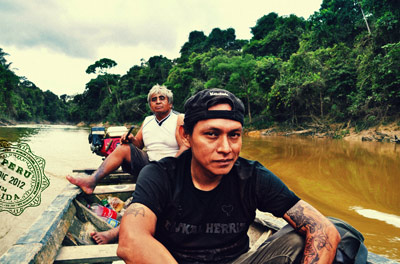basque heritage worldwide

02/27/2013

ADVERTISING
Bego Miñaur/Donostia-San Sebastian. Roberto Awa Nari was born in a village in the Peruvian Amazon called San Pedro de Tipishka, in the heart of the Kukama tribe. “The Kukama speak Kukama, a branch of the Tupi Guarani language family,” explains Roberto in Basque to EuskalKultura.com. “I’m not sure how many of us there are, because they say that we are disappearing. People are embarrassed to speak Kukama, and so only use it to joke, at home, or when they are drunk. Peru’s public school system influenced the lost of our language. It’s a shame.”
Roberto came to the Basque Country six years ago to act in a film and decided to stay in Basauri. Not only that, but he also decided to study Basque to completely integrate. “I was on unemployment and a friend that is a teacher at AEK invited me to learn Basque for free. This was a very important gesture for me. Basque gave me a place in the world,” he recalls.
Of the forest its people
Even though it is surprising, Roberto assures us that Basque and Kukama are very similar languages. “For example, the Peruvians make fun of us because when we speak Spanish we say things backwards: de la selva su gente” (of the jungle its people) or “de Juan su camisa” (of Juan his shirt).” It is a direct translation from Kukama, and so that’s why I say it is similar to Basque, for example: “ritama awakana”= “oihaneko jendea”, (people of the forest,) “juan chiru”=” Jonen alkandora”, (John’s shirt).

[The Great Kukama in the Marañon River (photo RAIN)]
It seems that there are words in the Amazon that are related to Basque, maybe leftovers of some Basque that was there many years ago: “In the forest in Peru you can hear words like “zuri,” a white worm (zuri is white in Basque), “motelo” a kind of turtle (motel meaning slow), “txalupa,” a type of canoe or “xiringa”…but this is another story.”
The anti-imperialist cure
In a story fraught with anecdotes, Roberto tells us that he learned his first Basque words in Peru, almost without being aware of it. He says that during the time that he was doing theater and played in a punk group in the street, a priest approached him and gave him magazines, books and a cassette.
“On the cover of the cassette it said, “Anti-imperialist music: songs in Spanish, Russian hymns, in Arabic…a song in a language that I didn’t recognize. If it is anti-imperialist, it’s OK,” said one of the group members, and we learned this phonetically:”uh uh uh colore bisía, arrasá ke riaren contra... uh uh uh colore gustía shenofó biaren contra...!" Roberto remembers. The priest was apparently a fan of Negu Gorriak.

[Roberto, another Basque mountaineer (photo RAN)]
Actor and musician
Roberto participates in activities favoring Euskera and gives talks on his experience. He thinks it might encourage others, even though he doesn’t want to serve as an example for anyone. After one of these talks in a school, they invited him back to teach the children crafts since the Kukama make everything by hand and he’s been a teacher for three years. He also works as a storyteller and Little by Little has begun an acting career; Secrets of the Kitchen, Dragon Hunter…are some of his films.)

[Above right, Roberto Awa Nari on the poster for Secretos de cocina (Secrets of the Kitchen, directed by Aizpea Goenaga)]
Roberto also plays the guitar in the group Dangiliske who he has performed with in the Basque Country and abroad: Germany, Greece, Catalonia, Mallorca, Bretagne…He recognizes that speaking Basque has opened many doors for him. “People open up when I speak Basque, that happens to me a lot. They are curious, they approach me…and after talking for a while, I’m just another local--well, at least that’s how I feel.”
He says that Basque has helped him get to know Euskal Herria and he feels that it is a language close to Kukama. “If you see people from the inside, from their roots, from their homeland, from their language, everything makes sense and there are no limits. Kukama and Basque are both indigenous languages.”
ADVERTISING
ADVERTISING
ADVERTISING
ADVERTISING
ADVERTISING
© 2014 - 2019 Basque Heritage Elkartea
Bera Bera 73
20009 Donostia / San Sebastián
Tel: (+34) 943 316170
Email: info@euskalkultura.eus